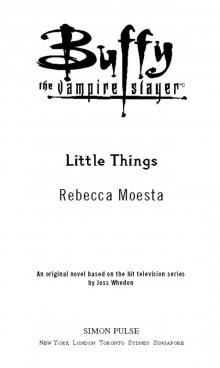- Home
- Rebecca Moesta
Little Things Page 6
Little Things Read online
Page 6
Chapter Eleven
Xander and Anya picked up Chinese takeout and walked back to their apartment. Xander clutched several white bags to his chest with both arms. Anya swung a handled plastic bag filled with napkins, hot red peppers, chopsticks, packets of soy sauce and hot Chinese mustard, and fortune cookies. Every block or so she reached into the bag, pulled out a few peppers, popped them whole into her mouth, and chewed.
“I hope our friends won’t find fault with our housekeeping. We are working people, after all, and there was no time for extra cleaning. Perhaps if we serve an alcoholic beverage their judgment will be impaired and they won’t notice any messes.”
“It’ll be fine, Ahn,” Xander assured her. “The apartment always looks perfect. If there’s one thing we do really well, it’s keep our apartment neat.”
Because Xander was carrying most of the Chinese food, Anya opened the door to the apartment for him. He went over to the kitchen counter and started to put down his bags.
“Xander, no. Not there,” Anya practically yelled. “Over on the table.”
He turned and carried the bags to the table instead. “All right, hearing still works perfectly. No need to yell. See, everything’s right on the table where you want—”
“You are no longer welcome in my home,” Anya said. Her voice was filled with cold fury.
“Ahn, I . . . it was just a… misunder—”
Before Xander knew what was happening, Anya had crossed to their tool drawer, opened it, snatched out a hammer, and swung it down hard—onto the kitchen counter. “You’ve been warned,” Anya said. “Now—you—will—pay—the—price.” She punctuated each word with a bang of the hammer.
Xander hurried over to her and grabbed her wrist. He looked down at the counter which she had been hammering and noticed for the first time black rivers of ants flowing across it. Several ants were carrying crumbs of toast or cheese puffs that seemed to be an order of magnitude larger than the ants themselves.
“Whoa, whoa, whoa there, slugger,” he said. “At first you think they’re harmless, now you’re ready to declare World War Three on them? Let’s pretend for a moment that we’re reasonable people. Put the hammer down.”
Anya looked at him, her eyes wide, their expression not quite rational. “Xander, we have guests arriving in less than half an hour.”
They had been together long enough that Xander knew full well when to switch tactics. “All right, I’m with you. These are insurgents, parasitic rebels. They deserve to be nuked. The counterinsurgency begins forthwith. But just remember, if we damage anything in the apartment we’ll have to pay for it.”
Anya’s expression changed to one of outright horror. Xander let go of her wrist. “Pay—our money?” She let the hammer fall from her hand to the floor and anxiously examined the countertop for signs of permanent damage, then swung open a cupboard, snatched a cookbook and slammed it down flat on thousands of hapless ants. “Pay?” she repeated, slamming the book down again. “I didn’t ask them here. How could anyone hold me responsible?” She glared at Xander. “I won’t let them take my money. Who is responsible?” she demanded.
Xander thought for a moment. “Well, whoever owns the building, I suppose. That’s why God made landlords and managers, I guess. Yup, that’s it.” He grabbed the phone, glanced down at the list of numbers taped next to it, and dialed.
Minutes later the apartment manager, an ample redhead in her early fifties, was at their door. “Here,” she said, handing Xander a container of Anti-Gone, an aerosol can with a picture of an ant weeping at a gravesite on it.
“That’s it?” Xander asked. “Bug spray?”
The manager rolled her brown eyes. “They’re ants, not a pack of rabid dogs. That ought to do it.” She made an indifferent gesture with one hand. “If not, call me.”
Xander went back to the kitchen, where Anya was wiping up legions of dead anty bodies. He chuckled and made a sound like an air-raid siren, then knelt by the baseboards. “This is not a drill, boys. You are going down.” He began to spray.
Chapter Twelve
“Is anybody else starting to think our Scooby gang is obsessed with food?” Buffy asked, staring doubtfully down into a carton of kung-pao chicken.
Xander pressed his lips together and pushed them out in a considering look. “What’d you have for lunch?”
Buffy grimaced. “I, uh, got busy. Guess I just forgot.” She couldn’t very well admit that her tooth had been paining her too much to eat anything.
Xander nodded. “Willow?”
“Chips,” Tara answered for her friend.
Then, seeing Buffy’s surprised look, Willow added, “Oh, but Sun Chips. So, very nutritious.”
“And orange juice,” Dawn said.
Xander was grinning by now. “Giles, Anya?” he asked the last two people in the room.
“We, uh, had some apples between customers,” Giles said.
Xander leaned back in his chair at the dinette table and spread his arms in a see-what-I-mean gesture. “Hardly what I’d call obsession. Besides, they say an army marches on its stomach. We eat to keep up our strength. No one’s going to be caught unprepared.” He crossed his arms over his chest. “Not on my watch.”
Buffy decided that her tooth probably couldn’t handle the peanuts and celery in the kung-pao chicken, so she opted for the chicken chow mein instead.
“I believe we have significantly more important matters to discuss than how often one needs to eat,” Giles said.
Dawn tilted her head to one side. “I wonder how often vampire fairies need to eat.”
“Mmm. Indeed.” Giles helped himself to some fried rice. “Yes, well, perhaps I’d better go first. Get the ball rolling so to speak about what we’ve learned today.” He raised a loose fist to his mouth in a thoughtful pose for a moment, then cleared his throat in that ahem-the-lecture-is-about-to-start sort of way. “Countless cultures around the world have mythology that scholars prefer to interpret as references to fairies—such as pixies or genies. Thomas Keightley, for example, believed the derivation to come from the Persian word peri, later bastardized by the Arabians to feri, but it’s clear, at least for our purposes, that the linguistic origin is of less importance than are the few factual references to these creatures.”
“Did you try the Watcher Diaries?” Buffy asked.
Giles nodded. “Nothing, I’m afraid. There is a dearth of factual accounts, but I pieced together what I could from my collections of reference books. As best I could ascertain, fairies themselves actually originated in mainland Europe.”
“In Italy,” Anya added.
Giles blinked several times. “Yes, quite. They were known as the fatae amongst their own kind. It is believed that the word fatae derived from the Latin Fata, the goddess of fate. It would seem that fairies tend to be rather gregarious.”
Xander spoke up now. “Sure, you’ll find the occasional lean and hard-bitten loner fairy, but for the most part they like to live in merry little bands of teeny-weeny boy fairies and itsy-bitsy girl fairies, all ruled by an eensy-weensy lady fairy.”
“These bands,” Giles continued smoothly, “are known as fatara, or troops. Each troop is ruled by a queen.”
Buffy poured herself some juice from a pitcher on the table. “You mean like some kind of überfairy?”
“I suppose so, yes.” Giles pulled apart a pair of disposable chopsticks. “From Italy, the fatae migrated to France, where the name was shortened and they became known as the feie.”
“May I offer anyone deep-fried pig in fluorescent orange gravy?” Anya asked brightly.
“Sweet-and-sour pork anyone?” Xander translated.
Giles accepted the carton. “Unfortunately, true scholarship on the subject seems to be somewhat spotty at best. We do know that fairies—or at least stories of fairies—had reached the British Isles by the fifteen hundreds. Spenser’s The Faerie Queene was published in 1590, and the Scribe himself included a story of Fairy Queen Mab in Romeo and
Juliet in 1595.”
“Ooh, Mercutio’s speech. I memorized it for Miss Miller’s class junior year,” Willow said. She recited in a dramatic tone,
“And in this state she gallops night by night Through lovers’ brains, and then they dream of love;
O’er courtiers’ knees, that dream on court’sies straight;
O’er lawyers’ fingers, who straight dream on fees;
O’er ladies’ lips, who straight on kisses dream—”
“Yes, excellent. Thank you, Willow. And what did your studies turn up?” Giles asked. “Er, do we have any mu shu?”
“Yes, and I ordered extra pancakes.” Anya passed him the carton, the pancakes, and the plum sauce.
“Well, kinda good news, bad news,” Willow said, answering Giles’s first question. “The good news is that there are hundreds of sites on the internet dedicated to fairies. Thousands, maybe.”
“And the bad?” Giles asked.
Willow pointed her chopsticks at him. “Giles, it’s the Web. Most of these people aren’t academics presenting their research. They’re hobbyists, figurine collectors, fiction writers, high-school students, and who knows what else. Sure, maybe there’s a few nuggets of data hiding here and there, but do you know how hard it is to sift through all the . . . the junk to find anything that’s actually useful? How do I decide whether a source is reputable or not? I mean, we’re talking fairies, here. You said it yourself: There aren’t a lot of verifiable facts available.” She lowered her chopsticks and took a bite of rice. “We did find out that fairies have a weak sort of woo-woo mesmerizing power called glamour. That may be how they keep their victims from fighting or running away. We felt a bit of the glamour last night. If you’re not aware of it and you stare at them too long, you can get sort of sucked in, I guess. Oh, ick—not sucked. Forget the sucked.”
Handing Willow a spring roll, Tara picked up the narrative. “And we’re pretty sure they’re chaotic neutral—a fact that’s also supported by quite a few fairy tales. It’s one of several themes that come up over and over again. Dawn had a good observation about that.”
Dawn grimaced as everybody’s eyes turned toward her. “It wasn’t that big a deal. They wouldn’t let me do any real research. There are some simple things in fairy tales, though. Like fairies—duh—have magick.” She crunched down on a crispy deep-fried wonton. “Also, they’re usually cute or beautiful, and they generally return a good deed for a good deed and a bad deed for a bad one.”
“Kind of like a Fairy Golden Rule,” Xander mused.
“Yes, I suppose it is. Fair enough,” Giles said. “We should take that into account. Buffy, did you find out anything that might be of any use?”
Buffy swallowed a mouthful of chow-mein noodles and drew a deep breath. “Well, first I did a totally useless sweep of Weatherly Park. I thought I might have found something. There’s this little grassy hill in the park. Some stairs lead down into it. But I went down the stairs and… big blank wall.”
“A stairway to nowhere?” Xander considered this, wiping a drop of sweet-and-sour sauce from his chin with a napkin. “Sounds mighty suspicious. You sure?”
“Nothing but a bunch of concrete,” Buffy confirmed.
Willow seemed to brighten. “I could look at the city plans for you and find out what it was. That should be way easier than getting information about fairies.”
Buffy smiled. “Thanks, Will. Anyhow, post-park I decided to visit some of the churches. A lot of them have, you know, dark undergroundy-type places where fairy-sized vampires might try to hide during the day.”
“And did you find any?” Dawn asked.
Buffy made a face. “None. Oh, but I did meet Father Murphy. He’s Irish. I mean real Irish, like ‘top o’ the mornin’ and ‘where’s my shillelagh’ and all that. He says there are real fairies in Ireland, and that lots of people there believe in them. But they worship this, like, old religion and they would never, ever come near a church.”
Anya made a pfft sound. “I could have told you that.”
Just then, a knock sounded at the door and Anya went to answer it.
“Spike, avanti,” she said, opening the door to him.
He swept into the room, answering her in Italian. “Grazie. Ho molto fame.”
“We’re eating already,” Anya said. “You’re very late.”
The blond vamp held up a bottle made of dark glass. “Yeah, well I kind of figured it was B.Y.O.B.” When she gave him a blank look, he raised his eyebrows. “Bring your own blood? Picked up some Chateau de Piggy.” He walked over to the table. “Had to stop by the ol’ crypt anyway, clean myself up a bit. Didn’t think you all would appreciate the way I smelled after exploring the sewers.”
Xander gave the vampire a sarcastic smile. “And yet, no real improvement in smell.”
Spike ignored the jibe. “Say, is that hot-and-sour soup?”
“Si accomodi, prego,” Giles said. “And help yourself. We were just lamenting the fact that we have no real first-hand sources of knowledge about fairies.”
Anya blinked. “Of course we do.”
Buffy probed her sore tooth with her tongue and said, “I’m not sure we can really count Father Murphy. He’s never seen any fairies in person.”
Anya gave her a condescending look. “I’m not talking about Father Murphy. I meant me.”
Chapter Thirteen
Ordinary fairies were, at best, capricious creatures. Of course, Mabyana and her troop were not ordinary garden-variety fairies. And they were certainly not at their best. In the centuries since The Change, they had come to understand their vampire nature, combining it with their fairy personalities and abilities. Becoming vampire fairies had not necessarily been a good thing, but it could be fun. An edge of malice had added itself to their mischievous merrymaking. But the fairies never let that new element ruin their good time.
Tonight, the golden Fairy Queen and her followers planned to “do the town” of Sunnydale—literally.
Dorse, dumb as a rock, started off the games with his favorite witty prank. His aqua hair glowed as the fairies, by twos and threes, flitted from door to door on a quiet street, ringing doorbells and tapping at windows. In each case, they quickly darted to a safe distance from which they could enjoy the looks of confusion or worry on the faces of the residents who answered their doors.
Within fifteen minutes, no fewer than three police cars had arrived to check out reports of burglars, stalkers, and peeping toms. Dorse, along with the rest of the fairies who had come out to enjoy the evening’s revels, twinkled with laughter and spun somersaults in the air. Queen Mabyana laughed with them, but decided it was now time to let someone else lead the charge. She gave Tressa that honor.
“Let’s remember to be creative,” Mab said. “The Fair Ones have standards to uphold.”
Always a nature-lover at heart, Tressa already had a target in mind. Hair the color of ripe apricots streamed out behind the girl fairy as she made a beeline for the flowers. The Sunnydale Botanical Society had earned a reputation for cultivating one of the finest rose gardens in all of Southern California. Every year the gardens attracted thousands of visitors to Sunnydale, and tonight Tressa was one of them.
At the very first bush, she stopped to hover in front of a bright yellow blossom and inhale its scent. Then, impulsively, she spread her arms wide, flitted forward, and embraced the flower. Within seconds, as if shown on a stop-motion camera, the bloom withered and died. But Tressa did not let go. Bit by bit, the stem began to wilt, then the leaves, death spreading throughout the bush and down to the roots. Only after it was completely shriveled did Tressa flutter above the bush, survey her handiwork, and turn a delighted pirouette. Her sheer teal dress swirled around her. “Perfect.”
Mabyana, getting into the spirit, chose a rose bush for herself and threw her arms around a delicate rosebud. All about the garden, Vesuva, Dorse, Steet, and the others selected rose bushes . . . and rotted them from the inside out.
When e
very bush had been drained of life, Mab allowed Lucket to have his turn. The silver-haired fairy, who always wore lavender tights and a lavender jerkin, decided that family pets, especially outdoor dogs and cats, would be his special focus tonight. Under his direction, the troop harried every animal they could find, poking, tweaking, and nibbling until cats took refuge in trees or under houses, and dogs fled from their homes or barked until their masters came to shush them. For good measure, Lucket picked up Frisbees, kites, and other lightweight toys and deposited them on rooftops.
Next, Vesuva took her turn. Followed by a swarm of fairies, the raven-haired sprite skimmed along the surfaces of dozens of swimming pools and reflecting ponds. In each one she touched, the water turned a garish and unnatural color: day-glow orange, chartreuse, fuchsia. The colored water, in addition to making the neighborhoods look like a child’s paint box when viewed from above, had delightful staining properties. In fact, any human or animal that bathed in those pools would emerge looking like a dyed Easter egg.
Steet, of the cherry red, punk-cut hair, chose the streetlamps. Each narrow whipped-cream-dollop lamp rested atop a tapered column. Steet landed on the first one and concentrated on the light until it shattered in a burst of broken glass and sparks. Twinkling their amusement, the rest of the troop joined in.
Mab smiled in satisfaction. So much fun, and the night was still young.
Chapter Fourteen
Everyone stared at Anya. Buffy choked and spluttered.
“Bloody ’ell,” Spike said.
Xander shook his head as if to clear it. “Is it just me, or does anybody else think it’s just a little bit late to be bringing this up?”
Giles took off his glasses and cleaned them. “Anya, you do realize that we’ve all spent the past ten hours trying to find out more about fairies?”
Anya’s smile was cheery. “Oh, yes.”
“And yet you felt no particular compulsion to share this fact with us?”
Anya looked confused. “Well, I wasn’t hiding it. I told you that fairies don’t like to be seen and that they prefer to live in forests.”

 Little Things
Little Things Space Station Crisis: Star Challengers Book 2
Space Station Crisis: Star Challengers Book 2 Vader's Fortress
Vader's Fortress Asteroid Crisis: Star Challengers Book 3
Asteroid Crisis: Star Challengers Book 3 Moonbase Crisis: Star Challengers Book 1
Moonbase Crisis: Star Challengers Book 1 Anakin's Quest
Anakin's Quest Kenobi's Blade
Kenobi's Blade